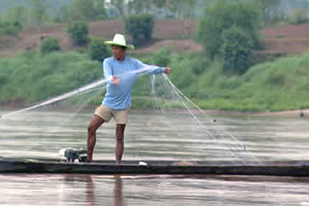Chinese dams disrupt Mekong lives
Chinese dams on the river have changed the lives of millions who depend on it.

 |
| Ouy Chai and his family are worried about feeding their familes because of Chinese dams |
Millions of people depend on the Mekong river for food and income. The Mekong has been called the lifeblood of Southeast Asia.
Keep reading
list of 4 itemsAfter the Hurricane
World’s coral reefs face global bleaching crisis
Why is Germany maintaining economic ties with China?
China has built hydroelectric dams which has had dramatic impact on those downstream groups and families. For many, China now has its thumb on the region’s main artery. David Hawkins reports.
During the rainy season, Tsot Ouy Chai, a Mekong River fisherman, trawls the river. When the dry season comes, he hangs up his nets and grows crops on the river bank. It’s a cycle that has sustained generations of people.
But over the past decade, life on the Mekong has become a lot less predictable.
“Sometimes there are no fish. Sometimes water rises very fast and dries out very fast too. It’s difficult to catch the fish,” Ouy Chai said.
Chinese hydroelectric dams built upstream have taken over from nature, holding back or releasing water to generate power.
The rapid rise and fall of the Mekong‘s water has caused serious damage to crops, and interferes with fish migration and spawning.
Tsot Montree Chantawong, a Thai environmentalist, blames the dam for causing the major change in the river system.
“Some types of fish disappear altogether … The problem is getting worse. The construction of two dams is finished and they’re building three more.”
Necessary measure
China says the dams are necessary to provide electricity to millions of people in the region. Vietnam and Laos are building dams too.
| Exclusive report | ||
|
|
But it’s not just the need for power that’s changing the course of the Mekong River‘s future.
Rapids are being destroyed, shallows dynamited and dredged, to make the river navigable for large ships.
Critics say that the people living along the river haven’t been consulted about these changes and haven’t had any help adapting to them.
Chantawong said: “The Chinese government should compensate the villagers along the south Mekong Rivers for the damage that’s been done.”
China has so far refused, saying the dams are inside China, so they aren’t responsible for what happens downstream.
Fishermen like Ouy Chai and their families are worried about feeding their familes.
“I am scared. What will be left for our children and grandchildren to eat?” his wife said.
The Chinese dams have changed their lives, and families downstream are currently powerless to reverse the flow of “progress”.
